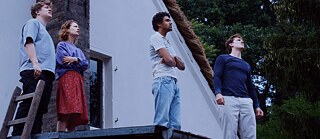Christian Petzold’s Competition film “Roter Himmel” (Afire) hovers dreamlike between utopia and dystopia.
Von Philipp Bühler
Press conferences with Christian Petzold are a pleasure. The same can only be said to a limited extent about his films, which have always been considered unwieldy. But there’s almost no one else who speaks with such enthusiasm about his own work, but also about cinema per se. Shakespeare’s Midsummer Night’s Dream had been an inspiration for his new film, he explains after the screening of Roter Himmel (Afire), but also “the French summer film genre”. When he uses terms like this, he always makes it sound as if he has just invented them. The idea for the film, which is now one of the five German-language Competition entries in the Berlinale, came to him during the covid pandemic. It would be about holidays being an emergency situation, about young people in a summer that feels like their last, and which progresses in a dreamlike atmosphere. Or, as Petzold puts it, “half asleep”.
Writer’s block on a Baltic beach
Friends Felix and Leon move into a holiday home by the Baltic Sea, where they are soon joined by Nadja and her lifeguard lover Devid. To begin with, Nadja and Devid are unseen and unwanted guests – especially for Leon, as they are distracting him from his work as an author. Apparently nobody is bothered about the forest fires approaching dangerously close to them – we are even shown a burning wild boar piglet. Felix and Devid get unexpectedly close, while Leon falls for Nadja – completely against his better judgment. Yet Petzold, a romantic of the so-called “Berlin School”, watches the amorous activities with an amused detachment. The focus is actually on the morose writer’s masochistic creative process – he retreats into his shell and never goes swimming while everyone else is enjoying life. It’s oddly comical in places. Until reality takes over and his beautiful story remains no more than a terrible memory.
Forest fires as a warning
In the
Roter Himmel press interview, Petzold makes it humorously clear how much he sees himself in Leon, a dreamer trapped between hybris and self-doubt. The fear of the second novel, the second film after the first success, is something he has endured himself. You could listen to him for hours talking yet again about the literary influences he feeds into his films, in this case Heine’s poem
Der Asra is recited no less than twice by Paula Beer. You’ll spot a few other elements from earlier films this time too: the dream logic from what’s probably his best film,
Yella (2007), the love of women on bicycles from
Barbara (2012). It would also be reasonable to call this his most self-referential and therefore personal film to date, after the Holocaust allegory
Phoenix (2014) and the escape drama
Transit (2018). But it’s also the film in which he more consistently than ever intertwines utopia with dystopia. Of course climate change is at the root of it all. If we do nothing, this burning hot summer will never stop.
